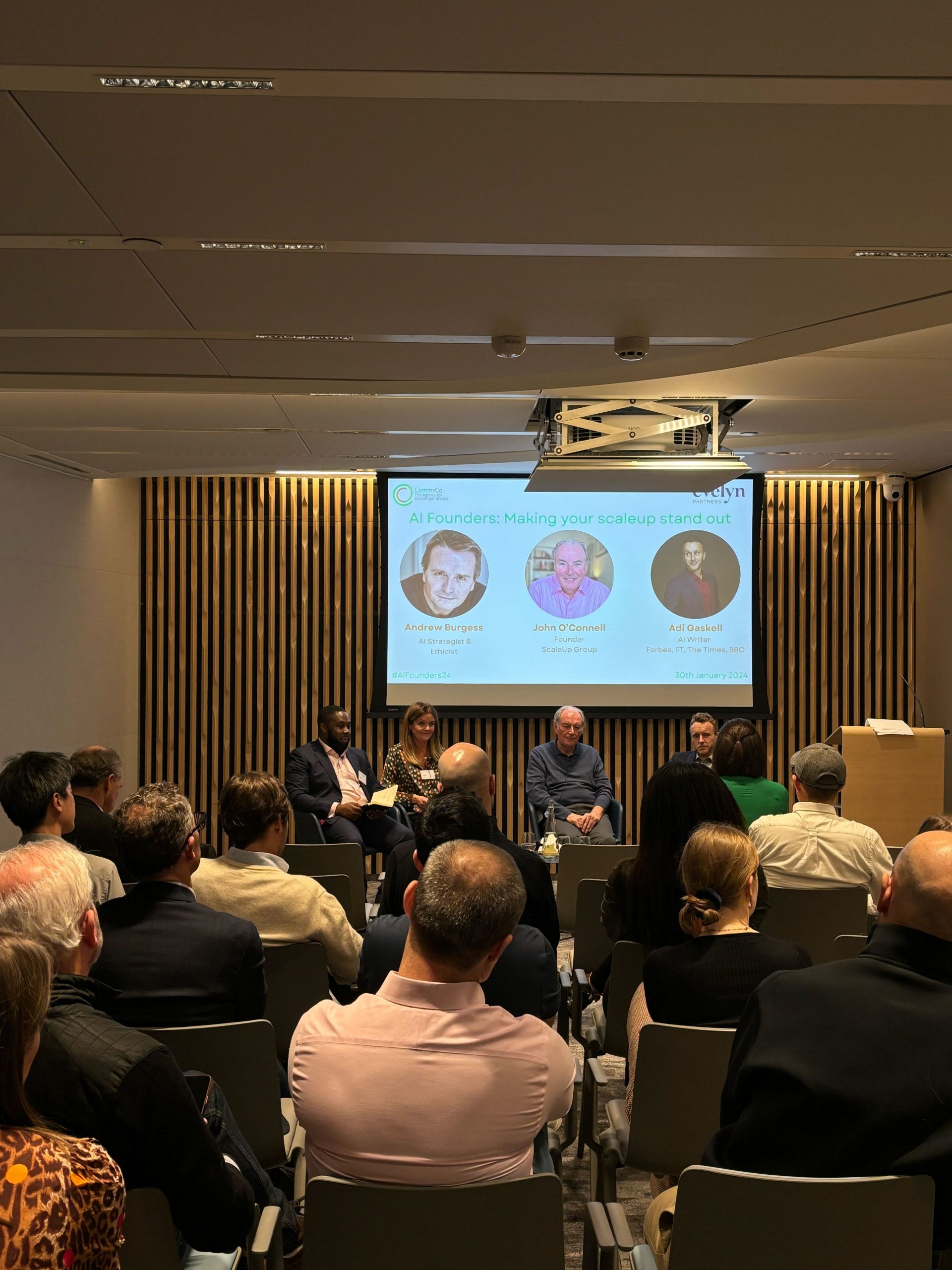The train strikes rolled in on our event day (once again!), but so too did a room full of AI scaleup founders and executives. In a way it was poetic. It mirrored the curve balls thrown at the industry and the ability to adapt and respond accordingly. And as our MD Ilona Hitel remarked in her opening statement, “The dichotomy between what we are talking about and the train strikes is not lost on me.”
Our event at Evelyn Partners centred on what makes an AI scaleup stand out. How do they differentiate when it comes to their product, funding or story? In a tech landscape awash with AI startups, developments and news – there were 1,100 new AI companies founded last year alone – founders can face a fine line between enjoying the rewards of a market brimming with opportunities and fighting a feeling of shouting into the wind to get a proposition heard.
To probe this premise, the panel of John O’Connell, Adi Gaskell and an ill Andrew Burgess embodied in the form of Ilona (basically, a two-for-one expert) spanned scaleup funding, media and AI strategy/ethics expertise and perspectives.
To kick things off, Ilona asked three questions of the audience:
1 – Who is still at the stage of building a go-to-market or product roadmap?
2 – Who is looking at funding this year?
3 – Who is creating their brand story or messages?
And for all three, a sizeable spread of hands were raised.
A common talking point throughout was how simply proclaiming you are an ‘AI company’ can border on the banal for investors and funds. The distinction is not that you are an AI company or use AI; there is an abundantly deep sea of those. The distinction is why are you using AI? How are you using it to solve pressing societal challenges? That’s what both investors and the media care about – and that’s what ensures AI is used for good.
The funding POV: why, why, why
From a funding viewpoint, John explained the biggest hurdle is trying to differentiate between ‘the hype’ and ‘the reality’. There is a growing cynicism building amongst funds over ‘AI companies’ – and understandably so.
As John proclaimed, “We don’t need new AI companies. We need companies who know how to use AI to provide benefits to society, business and their target market.” If you’re simply naming yourself as an AI company, are you really going to be competing with behemoths such as Google, Amazon and Open AI?
This is why you need to ask ‘the three whys’.
Why (are you doing it / what problem you are solving)
Why you (are well placed to do it)
Why now (is the time for it)
If you can answer these – and in particular the last one – then you have an audience for funds. The crucial part is not to lead with ‘what’ you are – instead, outline the benefits you are providing to your target market.
One audience member was keen to find out whether to go for investment now or to wait for 2025, when the economy may be rosier. The answer?
If you have an idea that stands up, experience in your area, and your proposition is strong, the money is out there. As John noted, “Don’t be a solution looking for a problem.” Identify the issues your market has, establish your uniqueness and form a robust go-to-market strategy. Everyone says they have AI: what differentiation does it make for your proposition?
But from a media stance, it’s not what you propose to do – it’s what you are already doing.
The media POV: achievements, not big promises
From blockchain to autonomous vehicles, Adi has been around the block hearing about hype cycles – and very few have delivered on their potential. His inbox is stacked full of promises to do ‘world-changing’ things – “But where’s the meat in that? What are you actually achieving?” He is not interested in big promises or huge fund raises; this is predicated on promise rather than delivery.
The world is facing ever-pressing societal challenges and priorities, whether that’s the climate emergency, inequality or crumbling healthcare systems. Are you helping to address these issues? As Adi remarked, during COVID it wasn’t the AI innovators getting clapped, but the nurses, cleaners and NHS staff.
The highest echelons of the tech world such as Jeff Bezos are looking for evangelists, not people who just want to get rich. The media want to see the mission that’s driving you. As Ilona outlined, when it comes to telling your story, you need to decide on your value proposition and who it resonates with.
The ethical strategist POV: the need for good brakes
The voice of Andrew was keen to emphasise that, when trying to stand out, scaleups need to ensure they are not too dependent on big tech firms – they can change direction quickly and leave you flailing behind. Moreover, the cloud and AI platform leaders today might not well be the leaders of tomorrow.
For the AI industry, the priority must be regulation – everyone is waiting for it. A line from Andrew that really struck home in the room was “with good brakes you can drive the car faster”. This moderation is vital for the industry’s growth, and the next year could see a lot of startups focused on regulation and ethical services.
More broadly, Ilona was keen to highlight the impending threat of AI and misinformation with major upcoming elections globally, while Adi explained how this relates to a current lack of trust in the media and democracy. How do we circumvent these problems? It’s something the industry must collaborate on.
Is your AI glass half full or half empty?
Despite proclamations 40% of jobs will be automated, Adi noted this has yet to materialise. Unemployment remains low and “the evidence suggests those companies who invest in AI employ more people as they have higher market share”. Whether this remains true or not is another story. As John (somewhat cautiously) exclaimed, the legal and accountancy professions are under threat.
What’s more, with copyright issues circling AI companies like sharks (the New York Times is suing Open AI/Microsoft for using copyrighted material to train its models), is this standpoint true for the media as well?
In Adi’s view, there will be publications who automate everything – but is that what readers really want? Even after decades of the internet, publications like The Economist still perform extremely well on a subscription model. This readership wants to hear opinions from human beings who know their field, rather than just read reported facts. As he astutely analogised, computers are far superior at chess, but we still want to see humans playing the game.
Concerning the tech sector, John noted the software industry depends on IP. So, “what happens if your software gets absorbed by an AI engine and is available open source globally?” Good luck suing Google was the message. Governments are right to look at these issues, but it needs to move quickly.
Standing on the precipice of change
In her closing thoughts, Ilona compared this time to her experience launching the first internet browser in a hotel with a Guardian journalist: “I knew that it was something that was going to be big. […] It feels like that now, but technological change and innovation is that much faster than it was then.”
The message? It’s time to buckle up, ride the waves and work together. Through collaboration, talent and responsible regulation, we can channel this AI scaleup energy into building communities and ultimately taking on the biggest societal challenges of our time.
A special shoutout to Nick, Charlotte, Will, Kim and everyone at Evelyn Partners for their partnership and generous hosting, to the panel and guests for joining us and contributing to a fascinating discussion, and, of course, to CommsCo’s Tomisin for his excellent and charming moderation skills. Here’s to the next one!
If you want to listen to a full recording of the event, stay tuned for a special episode coming soon on the CommsCo Tech Chat podcast.
Related Articles

New Proptech, Traveltech and Healthtech divisions for CommsCo as agency appoints experienced sector leads
Article by:Ilona Hitel


